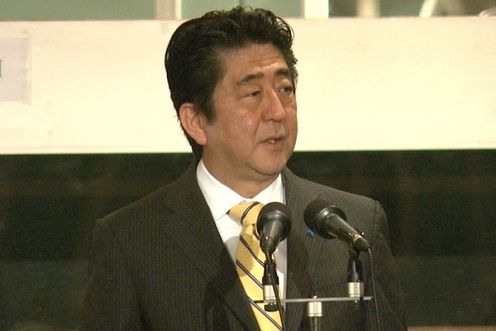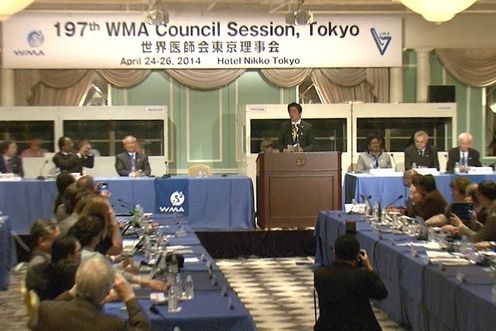Home > News > The Prime Minister in Action > April 2014 > The 197th World Medical Association Council Session in Tokyo
The 197th World Medical Association Council Session in Tokyo
Saturday, April 26, 2014

Photograph of the Prime Minister delivering an address (1)

Photograph of the Prime Minister delivering an address (2)
Prime Minister Shinzo Abe attended The 197th World Medical Association (WMA) Council Session, held at a hotel in Tokyo.
The Prime Minister said in his address,
“It gives me great pleasure to see the 2014 WMA Council Session being held today in Tokyo with the participation of 40 medical associations from around the world. I also would like to express my appreciation to President Yokokura for all his efforts as a representative of the host country, and to everyone else in the Japan Medical Association.
All people share a common desire of building a society in which we can live long and healthy lives. Regardless of the era, the trust we place in medicine to support our health, and in the medical professionals who bear this responsibility, remains the same.
Over the long, 67 year history since its founding, the WMA has worked to improve global health standards and establish medical ethics. I would like to once again express my respect for all your activities to date.
I have heard that the theme for the WMA this year is ‘universal access to healthcare.’
Japan is now the country with the longest lifespans. And it is precisely universal access to healthcare that is the principle behind Japan's healthcare policy. Anyone in possession of a health insurance card can receive medical treatment at any medical institution. Universal health insurance and the freedom to choose where you receive medical treatment are precious assets which the public, including those involved in healthcare in Japan, have been safeguarding for over half a century.
We must fully hand these assets down to future generations.
In addition, in the midst of the rapid advancement of the declining birthrate and aging population, an important issue is the creation of an environment that allows people to continue to live in the communities they are accustomed to for the rest of their lives, even if they need medical treatment or nursing care.
To that end, we must enhance home care and nursing care.
The doctors in charge of primary care in each region play a key role in bringing together medical treatment and nursing care. The role of medical associations in fostering such doctors is also important.
Japan will present the world with a model for a society in which anyone can live to their old age with peace of mind.
Personally, I have long struggled with the incurable disease of ulcerative colitis. The worsening of my condition forced me to suddenly resign from my post as Prime Minister seven years ago. I am now serving as Prime Minister for a second time, which is quite unusual for Japan.
That I am now able to carry out my job in good health is thanks to the blessing of advanced medical treatment, including new pharmaceuticals. I believe that no other Prime Minister recognizes the importance of medical treatment and pharmaceutical products as much as I do.
Progress in medical technology does not just improve the quality of life for patients, it is also a driver of economic growth that generates wealth and employment. In addition to leading the world in the promotion of the practical application of advanced medical treatment such as regenerative medicine, I would like to share the results of such efforts with the people around the world struggling with difficult diseases.
Furthermore, it is also important that we use the experience and knowledge that we have cultivated in Japan over the years and make an international contribution in the medical field.
I would like to not only supply medical technology, pharmaceutical products, and medical devices, but also to export packages built around the establishment of whole systems, including the universal healthcare system that Japan is so proud of.
In the past six months, we have already constructed cooperative relationships with the healthcare sectors of 14 countries. We will continue to promote efforts to make such an international contribution.
Lastly, I would like to conclude my remarks as Prime Minister by wishing for the further expansion of the activities of everyone gathered here today and for the further development of the WMA. Thank you for listening.”

